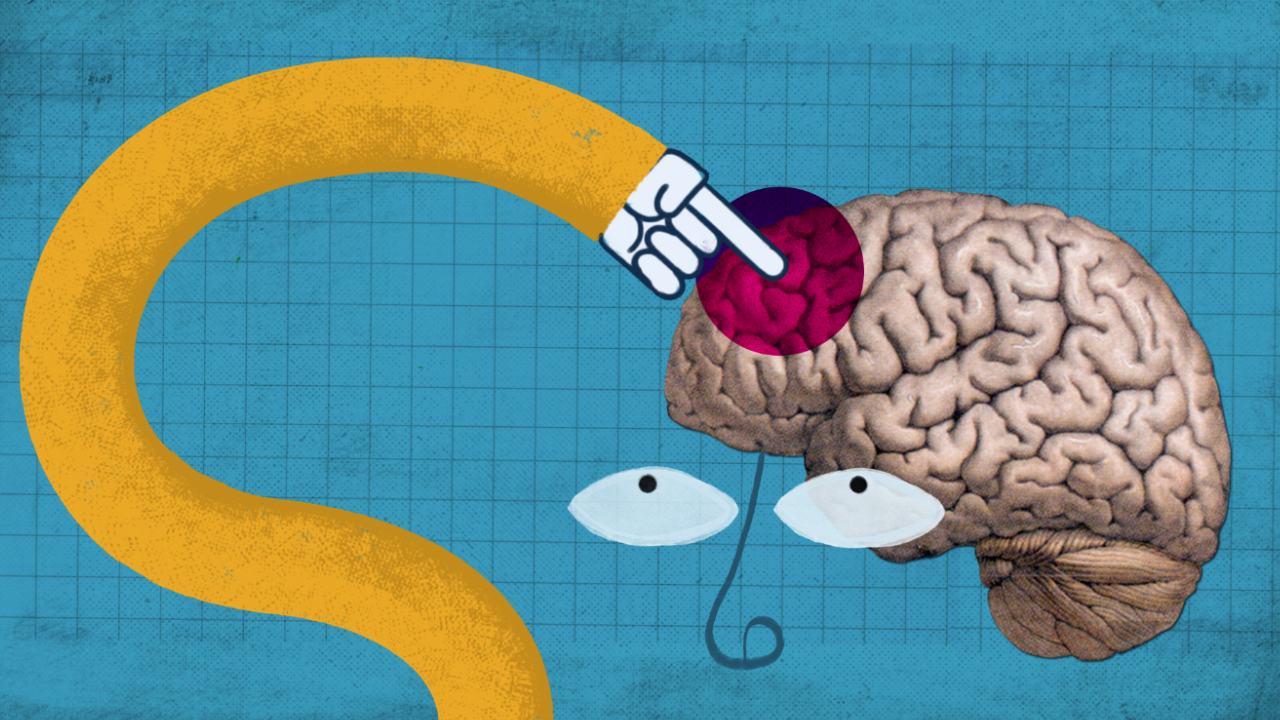Bills, family, health worries, jobs — Americans are some of the most stressed out people in the world.
And that was before coronavirus.
A 2019 Gallup poll of more than 150,000 people around the world found that 55 percent of American adults said they spent much of their past day stressed, 20 points higher than the global average. If continued for months and years, that’s a level of stress experts like UC San Francisco psychologist Elissa Epel call “chronic stress,” which is linked to elevated risks for health problems from heart disease to depression. And if that’s not enough, chronic stress can actually, physically age you, according to studies by Epel’s lab.
But take a deep breath. It’s not all bad news.
“We tend to think that stress is a bad thing, but actually it really matters what type of stress we're under, and how we respond to it,” she says.
Some stress, according to Epel, is actually good for you.
The good stress and the bad
Epel and her lab study stressors and our reactions to them — and how we react to stressors is more important than you might guess. Stressors can be acute or chronic.
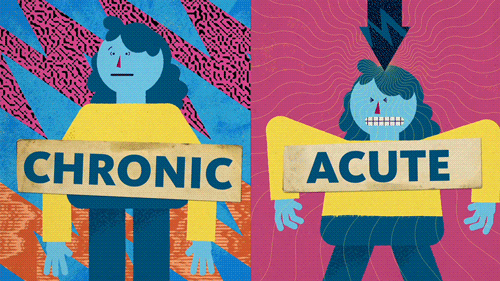
Chronic stressors are things that are ongoing — like financial strain, caretaking duties for a sick family member or a demanding job — the things that never seem to go away and deplete us.
An acute stressor might be a presentation you have to make in class, or trying something new you’ve been afraid to do. They’re a little bit like growing pains — your heart might pound, your palms might get sweaty, but it will soon be over — and once it is, you might even feel great. And not just because you took on a challenge and succeeded — your cells are reacting to this short-term stress in a very healthy way.
When worms or mice are exposed to short bursts of stress, they actually become healthier and can live longer, Epel says. That’s because of a phenomenon known as hormesis — when our bodies mount a stress response, they also mount a counterregulatory stress response to help us recover.

Credit: Giphy
Call it a “challenge” response to stress. The small dose of stress prompts an adaptation to stress, which leaves our cells younger. A process like “Pac-Men” in our cells starts cleaning up junk — what scientists call “autophagy.” The physical stress of exercise, heat and intermittent fasting may cause autophagy to increase. The science of autophagy is still emerging, but so far it seems like it can help protect us from diseases from Parkinson’s to Huntington’s, or even dementia.
Discoveries in the field won Japanese cell biologist Yoshinori Ohsumi the 2016 Nobel Prize in physiology or medicine.
But if your psychological reaction to chronic or even acute stress is a “threat response” — meaning you perceive a minor threat as a true threat to your ego or survival — you might not get the same beneficial recovery process. You may have a very slow physiological recovery from the stressor, and less clean up activity in the cell. You may even be unconsciously carrying this level of high alert around with you. It’s like a novice playing “Pac-Man” on the highest difficulty level. The ghosts win, and yet you have to keep playing. That’s your cells wearing out.
Is chronic stress making us age faster?
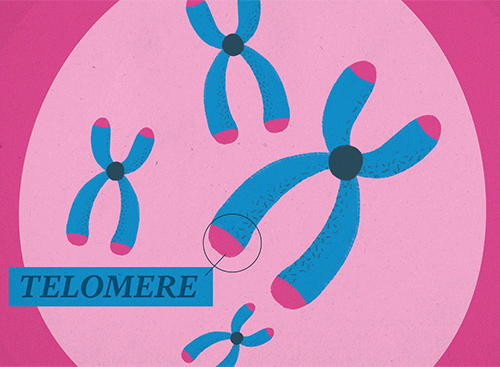
To get a clearer picture of how stress acts at a cellular level, Epel and her collaborators teamed up with UC San Francisco’s Elizabeth Blackburn, a Nobel Prize winner in her own right. Blackburn is a pioneer in studying cell aging. She studies telomeres, the caps on the end of our chromosomes, and telomerase, the enzyme that protects them from things like oxidative stress.
Our telomeres grow shorter as we age. Studies have shown that when people have genes for lower telomerase, they have more rapidly shortening telomeres and tend to get earlier onset of diseases of aging, like Alzheimer’s and dementia.
So Epel wanted to ask a very simple question — do people under chronic stress have shorter telomeres?
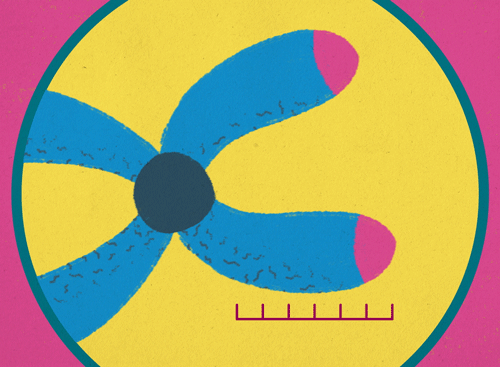
They measured the telomeres of people who report high levels of chronic stress — caregivers of children with serious ongoing medical conditions — and found a direct correlation between the number of years spent caring for their child and decreased telomere length. Having shorter telomeres means the cells will reach “replicative senescence” sooner, in that they will lose the ability to keep dividing into new cells, and will instead stick around wreaking havoc — creating inflammation in the blood. Chronic stress causes at least this one type of biological aging.
But when they took a closer look at the data, they found that shorter telomeres weren’t caused by the situation of caregiving but how stressed the caregiver felt.
“It wasn't being a caregiver per se that predicted one’s telomere length, but whether someone felt overly stressed by life. So the caregivers who have felt particularly high levels of stress from their life had significantly shorter telomeres,” Epel says.
How to build buffers against stress
Fortunately, scientists like Epel have learned many things about stress resilience by studying people in caregiving roles.
For women who reported higher levels of stress related to their role as parents, those who saw their role as giving their life meaning and purpose had the best biological health. The term researchers use for it is “eudaimonic well-being,” a term defined by UCSF assistant professor and psychologist Alexandra Crosswell as “a sense of inner wellness that comes from self-realization and feeling that one's life has meaning and purpose.”
Greater sexual intimacy with their partner was associated with better metabolic health and longer telomeres, too.
So how do we increase our resilience to stress, and improve our emotional health?
Creating buffers between us and our stress is one of the most important things we can do. One way is through daily habits that reduce physiological stress. An antioxidant diet (whole foods, fruits and veggies) is powerful. Deep, restful sleep is, too. Both have been linked to longer telomeres. And meditation or other mind body practices are important — creating restorative time for your body and mind to recover.
“When we become aware of how we are thinking during stress, and see these as just thoughts rather than reflecting some ultimate reality, we can actually take away the power these thoughts have over our body,” Epel says.
Conditioning our bodies to realize that a lot of the things we get stressed about aren’t life-threatening can be really helpful.
Triggering our “challenge” response with some types of brief acute stress can also help keep us healthy. Exercise is one of the most important things we can do in terms of chronic stress, Epel says. The Wim Hof breathing method, which involves meditation with a specific breathing sequence, is currently being studied by Epel and her colleague Wendy Mendes to see if it might induce cellular health and rejuvenation, too.
Other acute stressors commonly found in traditional cultures are also getting a closer look, including fasting and hot/cold exposure. UCSF assistant professor Ashley Mason, for example, is studying the use of sauna for relieving depression. Again, acute stress isn’t always good, because too much of it can lead to chronic stress. But paired with a positive mental challenge response, it may bolster our energy and health.
A new stressor: coronavirus
And what about the new stressor that has just landed in America — the coronavirus?
“It is natural and effective to have anxiety in the context of a pandemic,” Epel says. But we can use stress science to help us distinguish a useful stress response from an exaggerated one. Our anxiety about coronavirus drives us to perform safety behaviors like physical distancing. It's a miserable situation for many, but it does show how the natural stress response of fear motivates us to stay safe from natural threats. On the other hand, when we catastrophize about the level of risk, perceiving it as the apocalypse, we don’t think clearly and may engage in excessive panic buying, along with making others feel panicky, too.
Alexandra Crosswell has some tips on how to make the best of coronavirus anxiety.
“Research suggests that stressors can be good because they help us refine our values, focus on what's important in our lives, make needed changes (e.g. start exercising, cooking healthy meals, get more sleep), and help us connect meaningfully with our loved ones,” she says.
She suggests using this current moment to take stock of your life and make changes that promote a feeling of well-being — even if you're worried about the virus or the rapidly evolving situation. To the extent coronavirus is experienced as an acute stressor, and we don’t let it turn into panic, there are opportunities to be healthier.
Even having to work harder to make time for friends or to fill our time could actually be ... good for us.
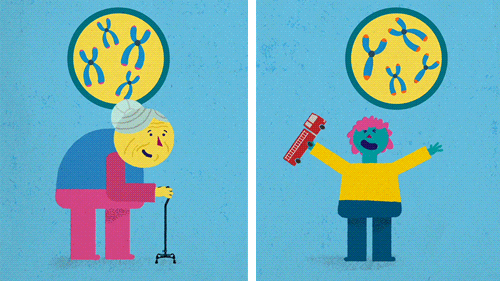
“Yes, it’s possible! Trying new things is good for us!” Crosswell says. “One of the keys to maintaining cognitive health as we age is novelty. One of my neighbors said her mother, who is in a nursing home and thus is isolated from visitors, is thriving because they got a new care staff and now she is in charge of showing the new staff how things work (e.g. this is how you wrap my leg, this is how we determine who sits where at dinner), and she loves the ability to finally feel like she's contributing and in control. Being open to the changes that this situation will force on us may be one of the best ways to cope with this uncertainty.”
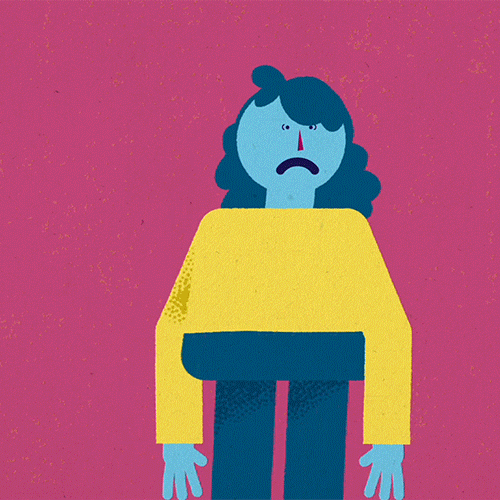
So while you might not like having to stay inside, think of it as a chance to pick up the guitar, take an online class in something new, or try a novel way of helping and connecting with others. There are studies that show that acute stressors (especially when perceived as challenges) directly lead to more creativity, too.
Of course, coronavirus is not just an acute stressor, and for some in the U.S. who are at very high risk it may already be overwhelming, or exacerbating existing chronic stressors. While meditation can’t fix the coronavirus or job loss, it can help mitigate the impact of the negative emotions that come with those pressures.
In a piece for the San Francisco Chronicle, Epel addressed some of the other ways we can cope with how coronavirus might affect us.
Humans are built for enduring long periods of adversity, Epel says. We get over stressful periods. As long as we don’t have a prolonged and exaggerated emotional response, we recover really well. Getting too absorbed in images of disasters on the media for too much of the day predicts longer term mental and physical health problems. Try to take only small doses of media, and many restorative breaks during the day.
She suggests we first acknowledge the situation, and that we cannot control it — but that we can control our behaviors to lessen the chance of contagion and “flatten the curve,” as they say. This has already been helpful in places like China, she points out, and it can work for us, too. Label your thoughts and emotions, so you can switch from an emotional mode to a kind and reflective observer mode: “So this is what it feels like to live in a pandemic.” It will help the emotion pass more quickly.
Epel also suggests we embrace the opportunity to be extra kind to ourselves and to others, acknowledging that anxiety is inevitable and commonly shared.
“One of the most powerful ingredients for stress reduction is warm, caring emotional support,” she writes. “Opportunities to help abound. Helping behaviors are known to be happiness behaviors as well.”
“We can check on elderly neighbors, friends and relatives who cannot leave home easily (especially if they are sick), with caring calls or texts, and offers to bring food and medications. Communities are rapidly building their own support networks, using networks such as Nextdoor or Facebook. This is a time we discover who we are as a nation, an opportunity to strengthen our worn-down social cohesion and live our core values.”
Whether it be the minor stressors of the everyday concerns, or the real threat of coronavirus, it’s important to nourish your well-being as a buffer and build your resilience. Learning to cope with stress has never been more important for your health.
🧠 Get more coping tips from Elissa Epel and UCSF's stress researchers.
💡 The research highlighted in this article was supported in part by the National Institutes of Health (National Institute of Aging, The National Heart, Lung, and Blood Institute, The National Center for Complementary and Integrative Health). Join UC in asking Congress to protect research funding.
